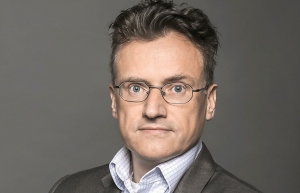German Supply Chain Act: Sustainability focus and Vietnam's implications
 |
| Huyen Nhu Lanh, coordinator of the project "Sustainable and Climate-Resilient Supply Chains in Vietnam" by the Delegation of German Industry and Commerce in Vietnam, AHK Vietnam (left) and Prof. Dr. Andreas Stoffers, country director of FNF Vietnam (right) |
How can German companies ensure sustainability under the German Supply Chain Due Diligence Act, and how should Vietnamese businesses adapt?
Lanh: The German Supply Chain Due Diligence Act (LkSG), which came into effect at the beginning of 2023, applies to businesses operating in Germany with over 3,000 employees. Starting in 2024, it will extend to companies with over 1,000 employees. Under this legislation, businesses falling within its scope are mandated to implement appropriate and effective measures to manage risks and violations to both human rights and the environment across their global supply chains. Importantly, this law does not establish new standards nor impose a duty of guarantee. Instead, it promotes an “duty of effort” approach, with a focus on continuously enhancing standards related to corporate social responsibility and environmental protection.
As a result, in order to meet the stringent criterias set by this regulation, businesses must meticulously assess region-specific and industry-specific risks and violations regarding these mentioned protected legal positions. Beyond adjusting contractual terms appropriately and systematically ensuring compliance, they should also motivate and support their suppliers in various ways to foster collaboration and alignment with the new sustainability goals. At the moment, many German businesses, in their updated Code of Conducts, require their suppliers to meet specific international standards such as BSCI, SMETA, ISO 14001, and others. These requirements might prove to be overwhelming for small and medium-sized enterprises (SMEs), making them an ineffective and inappropriate measure in the context of the law's criteria.
On the contrary, Vietnamese businesses should take into account the need for more frequent compliance checks from the buyer's perspective. Giving specific attention to the new terms within the Code of Conduct and the contractual agreements is crucial. In instances of non-compliance with serious damage, orders may be suspended until the violations are rectified.
How do you view the dual nature of the new developments, posing challenges and opportunities for Vietnamese businesses?
Stoffers: Compliance with this act presents significant challenges and costs for both German and Vietnamese businesses. There's also the risk of supply chain exclusion for Vietnamese companies. However, it offers an opportunity for adaptable businesses to build trust and become an attractive investment destination.
In my perspective, the supply chain law can yield long-term benefits by curbing violations and pollution, enhancing reputation, reducing costs, and expanding into new markets. Despite challenges such as expenses and complexity, Vietnamese companies should prepare to seize these opportunities, boosting Vietnam's economic attractiveness and resilience.
In what ways can the Vietnamese economy capitalise on this act?
Stoffers: The act opens several avenues for Vietnamese companies to thrive.
Firstly, it underscores the importance of human rights and environmental due diligence. Ignoring these risks can damage reputation, legitimacy, and stakeholder loyalty, potentially leading to exclusion from supply chains. By embracing the provisions of the LkSG, Vietnamese firms can position themselves as pioneers in supply chain diversification, a strategy known as "China + 1." This is particularly relevant as Vietnam garners attention from global customers.
Secondly, this act ensures legal certainty and equal rules for all, including both German and Vietnamese entities. Currently, companies may hesitate to invest in monitoring labour, social, and environmental standards due to the reluctance of competitors. However, the LkSG obliges them to embrace these standards, reducing the practice of free-riding. While the obligations under the LkSG don't bind Vietnamese firms, they make sense from a risk management perspective.
Thirdly, this act yields developmental benefits for Vietnam. By adhering to social and environmental standards, companies can improve working conditions and worker income, contributing to economic growth.
Fourthly, local businesses can enhance their resilience. Recent Organisation for Economic Co-operation and Development findings demonstrate that socially and environmentally responsible companies are better equipped to weather crises, fostering long-term benefits.
Lastly, Vietnamese enterprises can incubate their competitiveness by early adoption of supply chain law mandates. In the coming years, similar regulations will become more prevalent, especially in connection with the Sustainable Development Goals. Companies that prepare optimally will gain a competitive edge on the global stage and enhance their corporate reputation.
What have you observed regarding businesses’ reactions to social and environmental standards requirements?
Lanh: I've had the privilege of engaging with numerous Vietnamese businesses through training sessions, on-site visits, and discussions on these topics.
My impression is that tier-1 companies generally exhibit a heightened awareness of compliance, with some actively seeking solutions to bolster their adherence, while a few rely solely on certifications for validation. In contrast, tier-2 and subsequent tiers often respond with phrases like, "Social responsibility and environmental protection? It's a great and meaningful topic, but we just can't manage it."
It's evident that businesses have diverse needs, influenced by factors such as their size, objectives, existing management systems as well as the volume of orders they currently handle. Some may need a fundamental shift in their mindset towards sustainable and responsible business practices, while others may benefit from technical support to integrate these criteria into their management systems.
Additionally, some may require financial assistance to elevate their standards to the desired level, possibly starting with securing stable orders. Companies from the Global North cannot expect that, despite low purchase prices, adequate wages will be paid, working hours will remain within legal limits, and labour and environmental standards will be adhered to.
 | Vietnam rising as a global financial hub: why not? For many observers, Vietnam becoming a true financial hub seems an unrealistic vision. But why shouldn’t a bustling business metropolis like Ho Chi Minh City be able to develop into an international financial centre? |
What the stars mean:
★ Poor ★ ★ Promising ★★★ Good ★★★★ Very good ★★★★★ Exceptional
Related Contents
Latest News
More News
- State corporations poised to drive 2026 growth (February 03, 2026 | 13:58)
- Why high-tech talent will define Vietnam’s growth (February 02, 2026 | 10:47)
- FMCG resilience amid varying storms (February 02, 2026 | 10:00)
- Customs reforms strengthen business confidence, support trade growth (February 01, 2026 | 08:20)
- Vietnam and US to launch sixth trade negotiation round (January 30, 2026 | 15:19)
- Digital publishing emerges as key growth driver in Vietnam (January 30, 2026 | 10:59)
- EVN signs key contract for Tri An hydropower expansion (January 30, 2026 | 10:57)
- Vietnam to lead trade growth in ASEAN (January 29, 2026 | 15:08)
- Carlsberg Vietnam delivers Lunar New Year support in central region (January 28, 2026 | 17:19)
- TikTok penalised $35,000 in Vietnam for consumer protection violations (January 28, 2026 | 17:15)

 Tag:
Tag:

















 Mobile Version
Mobile Version